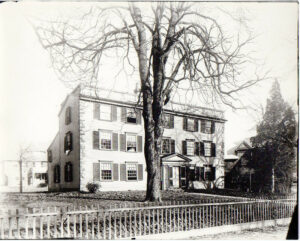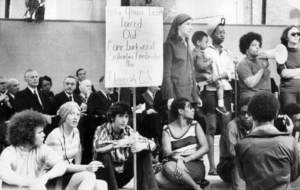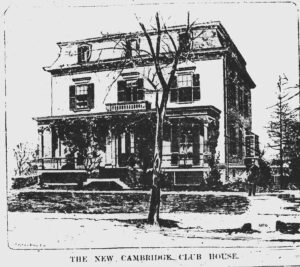Charles William Eliot’s Address – 275th Anniversary of the Founding of Cambridge (1905)
The following address was given by Charles William Eliot at the celebration of the Two Hundred and Seventy-fifth Anniversary of the Founding of Cambridge in 1905. It can be found in Volume 1 of the Proceedings of the Cambridge Historical Society.
Mr. President, Ladies and Gentlemen, Schoolgirls and Schoolboys, and Members of the Cambridge Historical Society:
I suppose that one of the reasons I have been able to do some small part of the work which Mr. Dana was good enough to describe in such ample phrase is that I have lived in Cambridge for fifty-six years, longer than most persons in this room have lived. Now, Cambridge is a good place in which to study, not only the history of the American people, but the history and development of their ideals; and if a man wants to learn what the leading ideas of the American people have been he cannot live in a better place than Cambridge.
I heard Mr. James F. Rhodes, one of the most distinguished historical writers of to-day, saying to a small company of gentlemen a few weeks ago that James Russell Lowell had a clearer view of the quality of the American people, a more perfect sympathy with them, a better appreciation and understanding of their gifts, ways, and hopes than any other American of the nineteenth century except Abraham Lincoln. Now, James Russell Lowell was born here, passed almost the whole of his life here, – the whole of it except when he was in Europe on eminent public service, – wrote here, and died here. For him Cambridge was that “pleasant and accommodate place” which it was for the infant College. Here he drank in the New England landscape. Here he learned to love the New England birds, the marshes of the Charles, and the ample scope of field, grove, and sky. Here he learned to love the people of New England, and to comprehend both their past and their future.
Why has Cambridge been so good a place to teach Americanism? Partly because it was founded for the magnificent purpose which Dr. McKenzie has described. Hither men came across the sea, under brave leadership, and with superb ideals, seeking freedom to worship God; and here they stayed to found a commonwealth and to build up their modest fortunes. They sought first the Kingdom of God, but other things “pleasant and accommodate” were added to them; and this Commonwealth became the most truly prosperous and the happiest community in the civilized world.
So Cambridge has been a good place for the College to grow up. But the College has returned in some measure these blessings, these favors from the town and the province. What characterizes the Cambridge of to-day in regard to its material possessions and resources? Moderation. There is not a rich man in Cambridge according to the standard of the times, not one. Plenty of people in comfortable circumstances, well-to-do, but not one rich man! What are the best houses in Cambridge to-day? Those that were built more than a hundred years ago. Our standard of living has remained simple and moderate; substantial, if you please, but plain. Now, the College has helped to that good end. Here have lived hundreds of men full of thought, and courage, and high purpose, but living simple lives. The presence of these men, generation after generation, has helped to characterize the place, has served to determine, in large measure, its quality; has made it wise, and strong, and simple.
This is a great service to be rendered to any community. It is a service which becomes more and more precious as the republic develops. Let us hope that this service will continue to be rendered by the University to the growing city and the growing State.
We cannot help but look forward with some anxiety to the future of Cambridge, because of the prodigious change in the nature of its population. The Puritans no longer control Cambridge; the suffrage is no longer limited to members of the Puritan church. Many races are mixed in our resident population. I visited not long ago a public kindergarten in Putnam Avenue. Among twenty-two children on the floor there were eight different nationalities; and the loveliest of the children was a little Russian Jewess. But let us look forward with good courage and with the hope and expectation that the same ideals which led the Pilgrims and the Puritans across the sea, the same ideals to which the people of this Commonwealth have held for two hundred and seventy years, will still guide the people of Massachusetts, mixed or conglomerate as they may become. They look back to various pasts, but may they look forward to one and the same future of public freedom, justice, and happiness.



